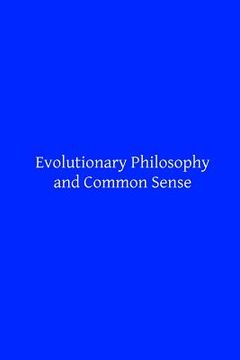Reseña del libro "Evolutionary Philosophy and Common Sense (en Inglés)"
What, for example, are we to understand by the word "Evolution"? We are constantly assured that, whatever else may be dark and doubtful, "Evolution" is an indisputable fact; this mode of accounting for it, and that, and the other, may indeed be unsatisfactory and improbable but, for all that, the question as to whether Nature has worked through" Evolution" has long since passed beyond the phase of discussion among scientific thinkers; the Darwinian system of Natural Selection is sinking more and more below the range even of hypothesis, while Evolution itself is almost beyond the range of doubt. "The theory of descent is safe," declares Professor von Hartmann, "but Darwinism has been weighed and found wanting." It is obvious, however, that to the term "Evolution" very different significations may be attached. It is unquestionably by a process of "Evolution" that an oak comes from an acorn, a butterfly from a caterpillar, or both from an egg. When we say that there has been" Evolution" in nature, are we to understand Evolution of this kind, the only kind whereof we have practical experience? Are we to say that one life-form produced another, inevitably and because" it was its nature to," as the seed produces the plant? Or, are we rather to say that there was no predetermination in the original forms of life towards one development rather than another, and that extrinsic causes have governed the production of those we now observe? It is obvious that the two things are not the same j they are, in fact, as different as possible. On the one supposition, given the original form, Evolution is secured, just as we secure salmon or trout for a river by getting the ova; the after-development being as much part and parcel of an organism as the initial state. But in the other case the original form has no more tendency to become anything else than has the ore in an iron-mine to become a steamengine; if it is to do so, it must be wrought on by forces altogether independent of itself. We may style the one or the other process "Evolution," but does it serve any useful purpose to turn the word loose on the world till we have determined which it means? To say that "Evolution" is established, but that we have no knowledge as to the mode in which it has been worked, is merely to declare, after the manner of the king's astrologer in the ballad, our power to divine that something has occurred, but not what that something may be. lt will doubtless be answered that we know the fact of Evolution by evidence altogether independent of the process which has ruled it. We find in life-forms a certain orderly gradation of types, one pointing to another, like footprints in sand; and, as from such footprints we can assure ourselves that a man or animal has passed that way, can learn what has been the course of the march of life. But the point to remark is, that in the one case we knowof a force that can cause motion from point to point, and in the other we do not. We must know that creatures walk before understanding the meaning of their tracks. Mere sequence does not necessarily imply connection. We have amongst crystals, for example, a wonderful progression of forms, the same general type being worked up, in the case of different elements, to greater and greater complexity.

